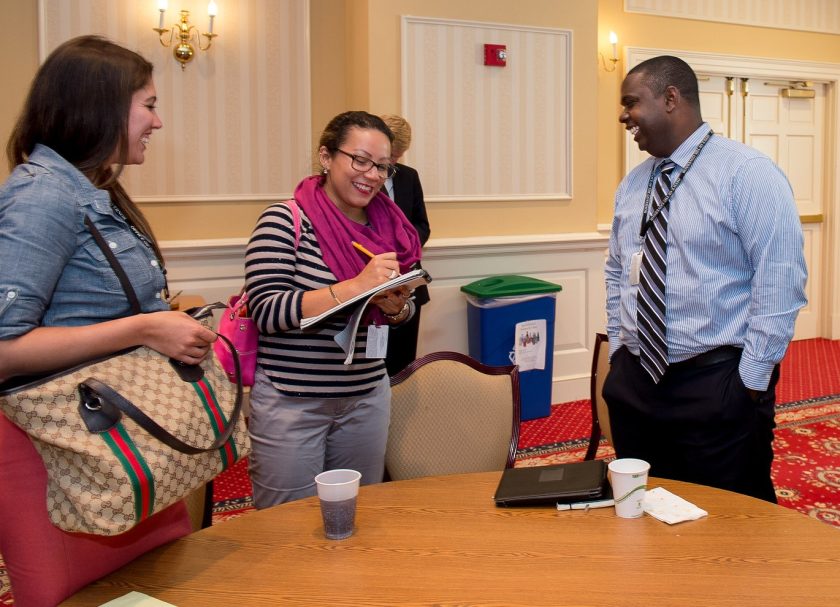
CHURCH MEETINGS: How to get formal and informal groups working cooperatively – Part Two

Credit: “All Staff Meeting” by MDGovpics is licensed under CC BY 2.0. (edited)
Have you ever been in this situation? A meeting is called at church and everyone comes to a decision about a particular matter. Then, as soon as the meeting is over, a couple of powerful people stand around in the car park and decide to do something completely different. Which decision holds? The decision from the formal meeting or the decision from the informal meeting? Could there be a role for both types of meetings, and if so, how can they work together effectively so that church life runs more smoothly, fairly and in alignment with God’s will?
Types of Meetings and their Various Purposes
Every organisation, including the local church, has two interwoven systems of governance with corresponding meetings, viz. the formal/official and the informal/unofficial. Each system requires regular meetings between the participants to keep things on track. Understanding how these different types of meetings influence one another helps us to coordinate our Christian work and avoid clashes and chaos.
Formal Governance and Meetings
The members of the formal meetings in the Uniting Church – those who carry out the formal system of governance – are officially elected or appointed. They comprise the congregational meeting where only official members may vote, church council, property and finance committees, pastoral care committees, the executive of the adult fellowship and so on. Their role is to make decisions big and small to order their particular part of the life of the church. They hold formal meetings which are forums where decisions are usually recorded in the minutes. Members of these meetings are official representatives of the wider group and they have the right to make decisions that affect church life.
Informal Governance and Meetings
The members of the informal/unofficial meetings comprise church attenders who form groups of family and friends. These family and friendship groups form the backbone of the church. They are hopefully channels of God’s love to one another and the various newcomers who cross the threshold of the church. No official vote is held to gain entry into these groups. Nevertheless, their membership is still controlled by particular people known as gatekeepers.1 Some gatekeepers readily allow newcomers to enter their informal friendship groups while others are more reluctant to do so.
Intertwining of Formal and Informal Systems of Governance
The local church is an organisation comprised mainly of volunteers. For this reason, the informal system of governance with its informal meetings is particularly important. We get into trouble when we try to apply approaches to governance gleaned from secular agencies that employ most of their staff. The dynamics in an organisation with a majority of volunteers are completely different from the dynamics in an organisation where most people are in paid positions.
Importantly, unlike secular organisations such as schools, hospitals and government departments, in the church, the informal system (family and friends) also fills the roles in the formal system of governance. In other words, members of the official councils and committees are drawn from the ranks of the ordinary church members who are linked together with the bonds of friendship and family.
Let’s take a look at some examples that demonstrate how the informal system of governance is linked to the formal.
Some of the ways church members meet informally include morning tea after church, in one another’s homes, meeting up for coffee, or bumping into one another in, say, the supermarket. The topics of these conversations often turn to “talking shop”. Opinions are voiced about how the church is going. What do we think of the latest idea the new minister or church council has come up with? In these conversations about the life of the church, opinions can be safely aired, and ideas can be tried out to see what others think. Efforts may also be made to influence one another. Various kites can be flown to see how they go. However, these conversations have no official standing. People can change their minds with impunity. They can come to new understandings or stick by their original position.
Informal groups can also initiate ideas and programs within the life of the local church. For example:
In a small group at morning tea after church the conversation drifted toward ministry to seniors. Several of us tossed around some ideas and decided that we would like to have a small discussion group to delve into these ideas more deeply. One woman took the initiative and discussed this idea with various people she thought might be interested. When she had enough people for a group, and had found a time and a place to meet, she approached the church council with the idea. Official approval was given and the group was added to the list of small groups already operating.
Thus, a discussion in a small informal group at morning tea led to the beginnings of a new ministry. This is an example of “every-member ministry” in the Uniting Church. It is also an example of the formal and informal systems working together productively.
Sometimes informal meetings of this type may be incidental and just occur naturally as friends and family meet together. They may also be deliberate if one person has an idea and tries it out with family or friends. Sometimes, informal meetings are held in order to lobby someone about a particular issue or in an attempt to develop a bloc of power in the formal setting. An example:
In my misspent youth, my younger brothers and I were members of the executive committee of our local church youth group. Before a youth executive meeting, we would sit around the dining room table at home and discuss the agenda. If anything important was coming up, we would decide in advance what we wanted the decision to be and would come up with suitable arguments. The other members of the executive didn’t stand a chance. We would usually get what we wanted.
Despite their lack of official status, informal meetings of all types are very important in the life of the church. They allow people to ponder on various options and maybe change their opinions, but without committing themselves until a suitable group decision can be made in a formal setting.
If there is sufficient time given to this informal system of governance, the process of getting an important decision through the formal channels is made much easier.2 However, as illustrated above, it can also be abused.
Clearly, two systems of governance do not operate independently of one another. They are intertwined in complex patterns of relationships. The relationships between the members of the informal groups often go back a long way and may be much deeper than the relationships between the official/formal group members. These relationships may cause formal governance decision-making to go awry. For example, confidentiality is fraught as husbands and wives, and best friends, sometimes share the information they are supposed to keep secret. This is not too damaging if the confidante keeps quiet; however, this is not always the case. As one person said rather ruefully, “The Uniting Church is a leaky ship.”
Friends also may have difficulty disagreeing with one another in a formal group.
One example:
When visiting Holland, the birth place of my Dutch husband, a friend complained that the new ideas of their enthusiastic young minister were being rejected by the village church council. My friend asked one of the dissenters why he had voted “No” to a new proposal put forward by the minister to establish a youth group. The man pointed to a fellow committee member and replied, “I voted no because he did”.
Another example:
The intertwining of the two systems was particularly noticeable when members of a formal committee would not make a decision until a particularly powerful person in the church had agreed to it. The person in question was not a member of any committee, but they held tremendous sway in the church nonetheless.
Formal meetings can also become very difficult when there is hostility between members. If people who can’t stand one another are elected to the same committee, their bad relationship may intrude on the smooth running of the group. People may disagree with one another just for the sake of it.
Thus, the formal system of governance within the local church is influenced, to a considerable extent, by the informal system of family and friends.
In the next blog, the power balance between the formal and informal systems of governance is discussed, with practical tips on how to ensure these two systems can work together effectively.
End Notes
- “Gatekeeper” is not a derogatory term. It is simply a fact of life. See here for more blogs on gatekeepers.
- I encountered this idea when interviewing a number of ministers for some research I was doing on gatekeepers in the church. The ministers said that if the people had a chance to get used to an idea, could toss it around informally with one another, and felt listened to, then the new plan would be accepted in the official meeting (church council) much more easily. Along the way the original idea may have been modified somewhat, but this was seen as a good thing. Taking things slowly was recommended.




